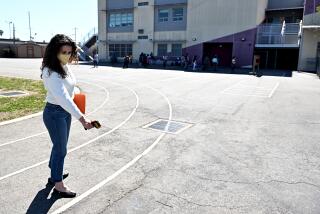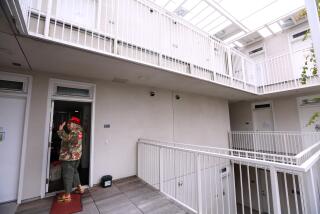Fallbrook Bid to Tax Without Asking Voters Stirs Protest : Education: Desperate to improve high school after two elections that failed, the district tries another way and meets resistance.
- Share via
After two demoralizing bond election defeats in one year, Fallbrook Union High School District trustees are admittedly desperate for money to improve the growing rural community’s jammed and deteriorating 35-year-old high school.
But the plan trustees are now pushing, a special tax to raise $3.7 million without a public vote, has ignited a property owners’ revolt and started grumblings about a possible recall election.
“It’s not an easy decision. The real solution is to pass a bond,” said Patrick Miller, board president. “But I will not sit by and watch it deteriorate into an overcrowded, threadbare and third-rate campus.”
It appears nobody in this wooded Western-style town disputes that their only high school is stuffed with students and needs renovation. But the notion of a tax without a public vote has raised a wrath uncommon to Fallbrook.
Ralph Enander, who had served 16 years on the board until he lost a reelection bid last year, said the community is ready to take political hides.
In fact, he said, even many people like himself who had worked for the passage of past bond elections are now soured.
“The reaction I’m getting is, ‘If they force this down our throats, I’ll never vote for a bond issue again,’ ” he said.
Enander and a coterie of like-minded people are busy these days, having already collected nearly 2,000 petition signatures in front of local supermarkets to dissuade the trustees from approving a special assessment district.
The district, which would be formed under the state’s Landscaping and Lighting Act of 1972, would tax homeowners up to $24 a year and commercial property $12 a year for perhaps 25 to 30 years. About 21,000 properties would be in the district.
Under the act, public agencies can form assessment districts to raise money for maintenance upgrading publicly used recreational facilities, such as tennis courts.
Revenue would pay for sports and recreation, including soccer field lights, baseball backstops, an improved track, new stadium bleachers and a rehabilitated gym and swimming pool.
A formal protest can be made if people owning at least 50% of the land within the proposed district sign the petitions opposing the assessment district. However, the law allows the protest to be overridden if at least four of the five trustees vote for the district.
The law historically has been used by cities and water districts for such improvements as median strips and sewer services, cases in which the beneficiaries were clearly defined. But recently, revenue-strapped school districts have reasoned that the whole community benefits from such facilities as football fields and basketball courts, and have looked at forming districts that cover all their constituents.
If all this sounds familiar, it is.
The Escondido Union High School District’s board, seeing the dismal record of
bond election defeats in the county, considered a similar assessment district. But, confronted by public opposition and their own doubts about the fairness of taxation without a vote, Escondido trustees abandoned the idea last month.
A school district in northern Orange County last week passed a $17-a-year assessment fee, and a proposal for a $50-a-year fee in Huntington Beach drew a protesting crowd of 1,000 homeowners.
Despite the public outcry against against the special tax, Fallbrook’s trustees say there’s no other way they can get money to upgrade their high school to handle growth.
The town has only 22,000 residents, but that’s 57% more than the 14,000 it had 10 years ago. Fallbrook High School was built for 1,200 students but now squeezes in 2,300 pupils with the aid of portable classrooms.
And that number is projected to grow by 200 per year as the community’s 11 elementary schools feed in more and more students, according to Supt. Robert Thomas.
“The more people you crowd in a small space, the greater potential for problems,” Thomas said.
School officials at first felt the only answer was a $35-million bond measure to renovate Fallbrook High and build a second high school. In a cliffhanger June 1990 election, the first bond measure failed by about 100 votes. The following November, a similar bond campaign went down by a greater margin.
Those two bond measure defeats followed a third voter rejection of bonds in the late 1970s.
“This community is O-for-3 in passing bonds,” Miller said dismally. “Most people don’t understand the urgency of our need.”
So, although the trustees couldn’t seem to get bond funds to totally rehabilitate Fallbrook high and build a second high school, they’ve resolved to seek at least $3.7 million to upgrade sports and recreation facilities.
Trustees realize the proposed tax assessment district may be unpopular, but said they feel trapped. “This is the only thing available that’s left to our board, outside of bonds, to raise funds,” said Thomas, who has been with the district for 25 years, 14 as superintendent.
Both Thomas and Miller say the special tax for sports and recreation is only a stopgap, and that, eventually, voters must be asked again to approve bonds for new construction.
Thomas said he would eagerly push for another bond measure immediately if he believed there were enough volunteers to wage a campaign to win a two-thirds majority vote needed for approval.
“If I thought there were enough people to do the work, I’d go for it,” he said. “But I think people are worn out.”
Former trustee Enander readily agreed that something must be done to help the aging high school, but he said a tax without a public vote isn’t the solution.
“It’s the principle of the thing that’s bothering me,” he said.
Another tax foe, Dennis Holman, an investment broker who has lived in Fallbrook for six years, said he’s had no trouble gathering protest signatures. “We’re collecting signatures at a rate at one site of one (name) every two minutes,” he said.
Enander and Holman each worked for passage of the school construction bonds, and they worry that the proposed tax will have a double-edged voter backlash.
There’s talk of a recall campaign to force trustees from office, and, Enander said, “I hope we never have to go to that, but if this goes through, I wouldn’t be surprised if some of the folks who are upset begin that process.”
And Holman fears that voter hostility over the proposed tax will make it even more difficult to court additional voters whose support is needed to gain a majority for a future bond measure.
“That critical group, the margin, is being alienated by this approach,” Holman said.
District officials, saying they’re trying to be fair, argue that it’s reasonable to tax property owners because the community uses school recreational facilities--the gym, the pool and the track.
Further, Thomas said, a formula has been developed so homes closer to the facilities pay $24 a year in the assessment district, while homes farther away are taxed only $12 a year.
Still, the trustees have won few converts, and Miller acknowledged that, of the 100 people he’s talked to about the tax, about 75 opposed it and only 25 were in favor.
Holman said what trustees should do is plan a new, better-organized bond measure to put before the voters. “I think it just needs some damn hard work, some stumping, to get out the vote,” he said.
So far, there’s little enthusiasm by trustees for undertaking another bond campaign after the two rejections last year. And, there appears to be no desire to thwart the community’s will if the petition shows that a majority opposes the proposed tax.
“If it’s voted down, I’m not going to try to override it,” said Miller.
The next move comes tonight, when trustees will hold another hearing on the tax issue.
If protest petitions are presented then, the trustees will probably have them evaluated to see whether owners of a majority of the property are against the tax, then trustees will decide on the tax at a later meeting.
More to Read
Sign up for Essential California
The most important California stories and recommendations in your inbox every morning.
You may occasionally receive promotional content from the Los Angeles Times.













